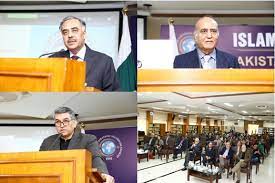CPEC seen as “an enabler” for building capacity, meeting fundamental needs

Islamabad: Institute of Strategic Studies Islamabad (ISSI) has concluded its two-day annual flagship event, “Islamabad Conclave 2023,” with key takeaways by experts and practitioners for the country amid changing global order where China-Pakistan Economic Corridor (CPEC) was seen as “an enabler” for building capacity and meeting fundamental needs.
Director General ISSI Ambassador Sohail Mahmood presented the key takeaways from the five working sessions.
In his speech, Mahmood at the third session’s takeaways, he stressed that the CPEC is framed as a transformative project, catalyzing Pakistan’s economic revitalization and as an enabler for building capacity and meeting fundamental needs.
“In the same manner, geo-economics, a component of national security through economic security requires a national consensus achieved through open debates within the country,” he added.
Mahmood stressed that prerequisites include political stability, rule of law, anti-corruption measures, macroeconomic stability, economic diversification, public-private partnerships, trade facilitation, and energy, social, and environmental sustainability.
Earlier, highlighting the takeaways of the first working session, he reiterated that the emerging global landscape is marked by the expansion of alliances, collapsing existing arms control regimes, nuclear modernisation, militarisation of outer space, cyberspace, artificial intelligence, and biotechnologies.
He maintained that strategic stability is constituted by a stable equilibrium where: there is no incentive to go to war; there is little temptation for arms race and equilibrium will be least affected by technological or political development. Strategic stability in South Asia is adversely affected by Indian actions on all these accounts.
While elucidating the key takeaways of the second working session he stated that achieving stability in Afghanistan necessitates a comprehensive approach, considering the exodus of the educated class from the country with a focus on effective humanitarian aid utilization, shift to a livelihood-focused model and women inclusion in Afghanistan.
Touching on the highlights of the fourth working session, Ambassador Mahmood reiterated uncontrolled population growth as a significant threat, emphasizing the need for proper population management strategies.
“Pakistan requires fundamental transitions in policymaking, finance, and institutions for comprehensive security, moving away from conventional approaches. Pakistan also needs to invest in human capital. To harness the youth bulge, Pakistan needs transformative policies, departing from the unsustainable business-as-usual approach of the past seven decades. To attain sustainable development goals, Pakistan should transition from the ‘do more’ approach to a strategy of ‘doing ourselves,’ involving national will and ownership,” he opined.
Presenting his vote of thanks, Chairman Board of Governors (BoG), ISSI, Ambassador Khalid Mahmood said that the proceedings of the Conclave brought attention to Pakistan’s future strategic blueprint.
He thanked the keynote speakers as well as panellists of all the sessions, and extended appreciation to the team of ISSI in making the Conclave a success.
The Conclave was attended by participants belonging to diverse fields including academia, civil society, think-tank community, policy practitioners, diplomatic corps, students, and the media.





